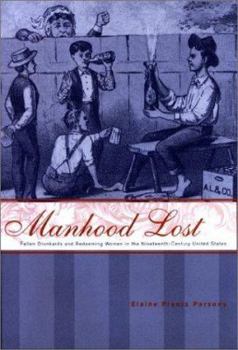Manhood Lost: Fallen Drunkards and Redeeming Women in the Nineteenth-Century United States
(Part of the New Studies in American Intellectual and Cultural History Series)
Select Format
Select Condition 
Book Overview
In fiction, drama, poems, and pamphlets, nineteenth-century reformers told the familiar tale of the decent young man who fell victim to demon rum: Robbed of his manhood by his first drink, he slid inevitably into an abyss of despair and depravity. In its discounting of the importance of free will, argues Elaine Frantz Parsons, this story led to increased emphasis on environmental influences as root causes of drunkenness, poverty, and moral corruption--thus...
Format:Hardcover
Language:English
ISBN:0801871662
ISBN13:9780801871665
Release Date:June 2003
Publisher:Johns Hopkins University Press
Length:256 Pages
Weight:0.74 lbs.
Dimensions:0.8" x 6.4" x 9.3"
Customer Reviews
0 rating





